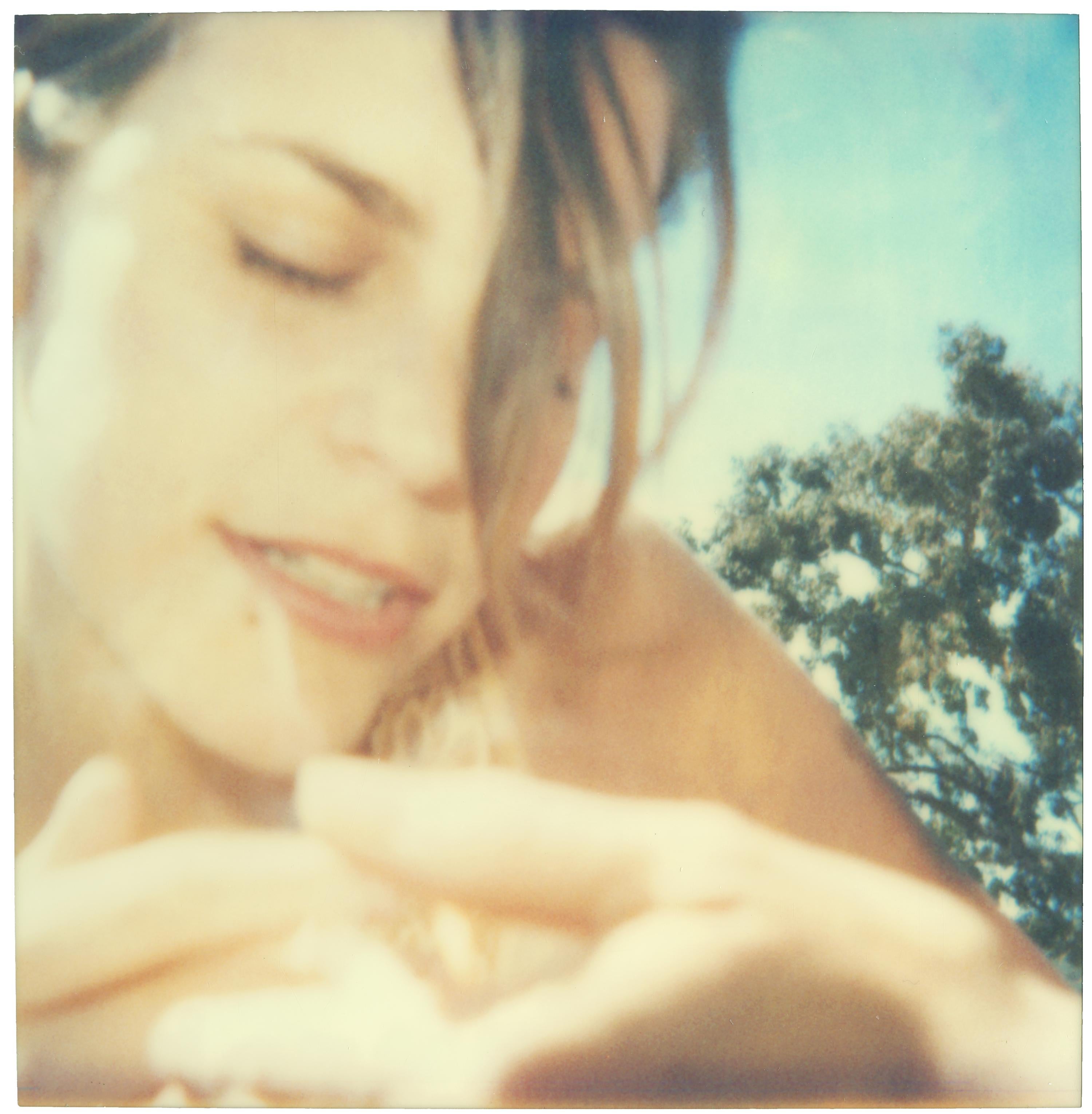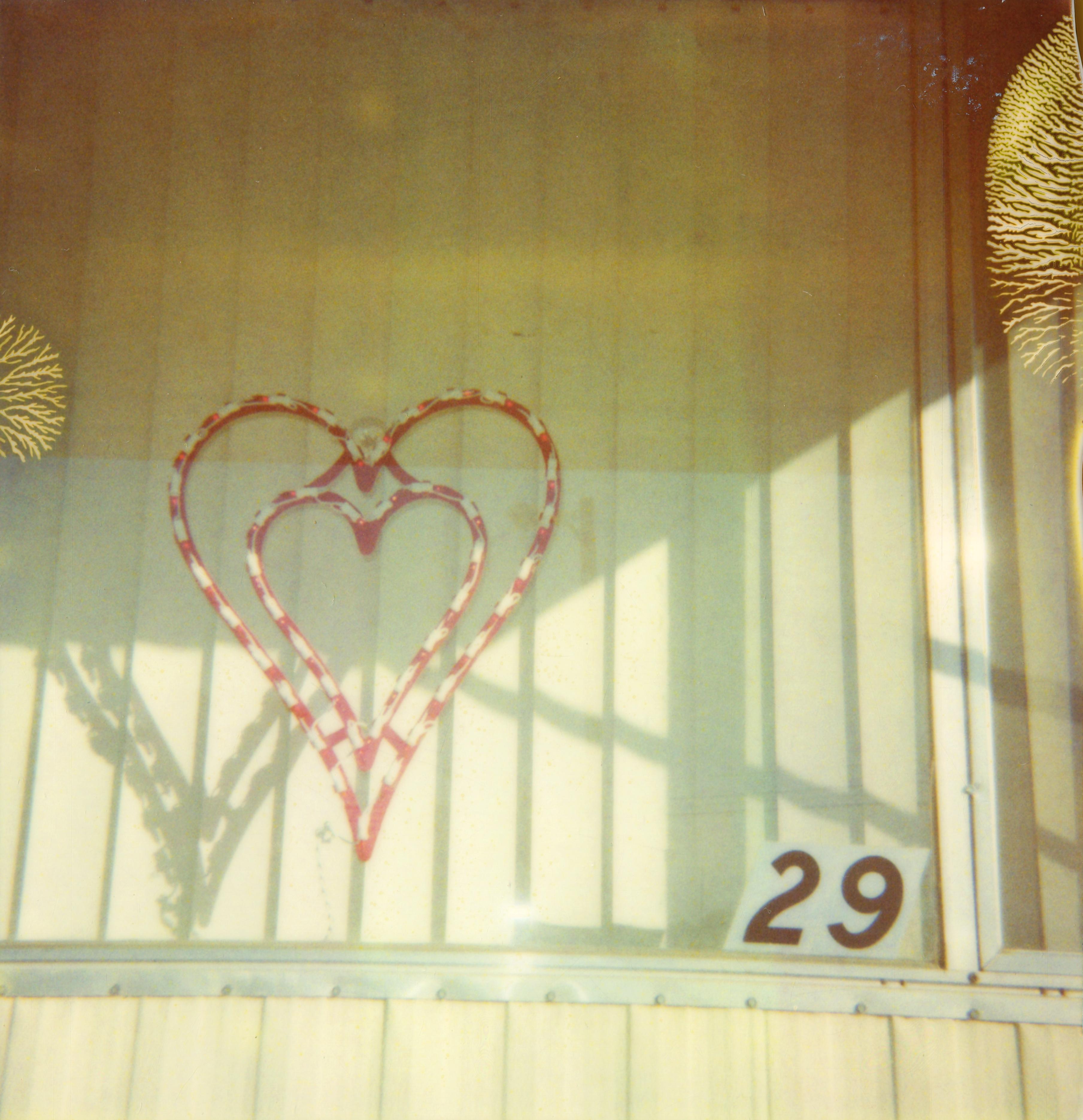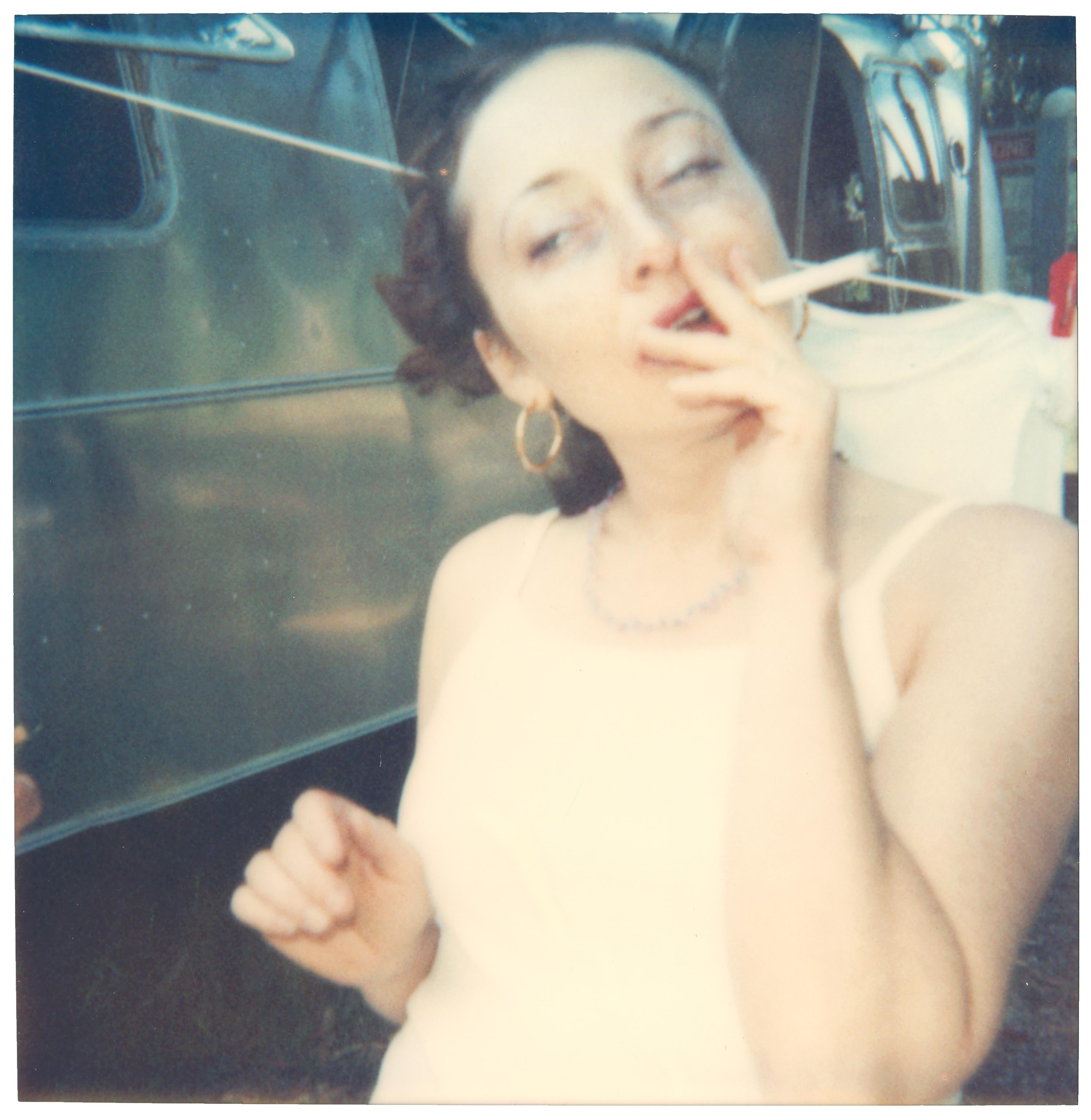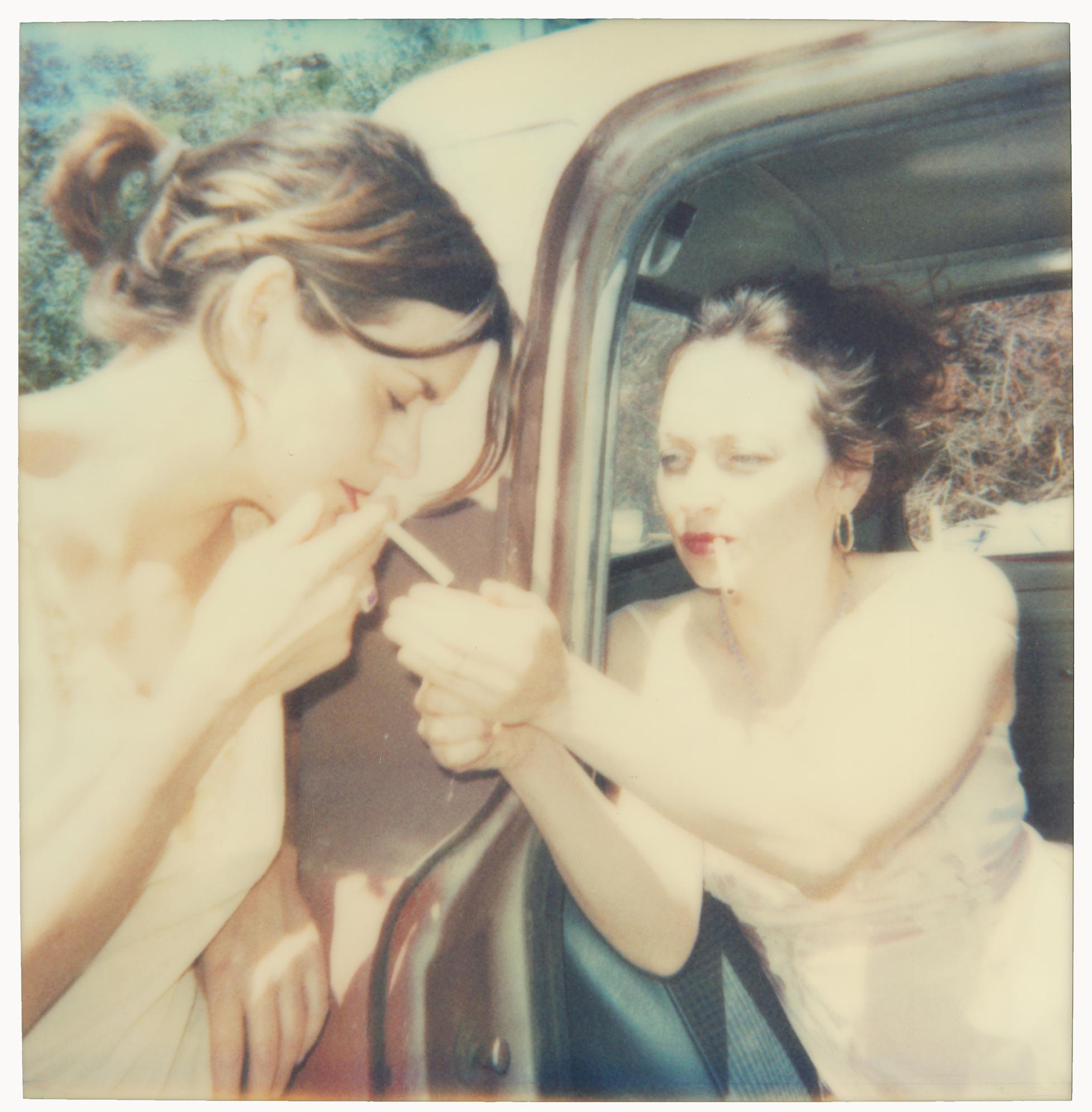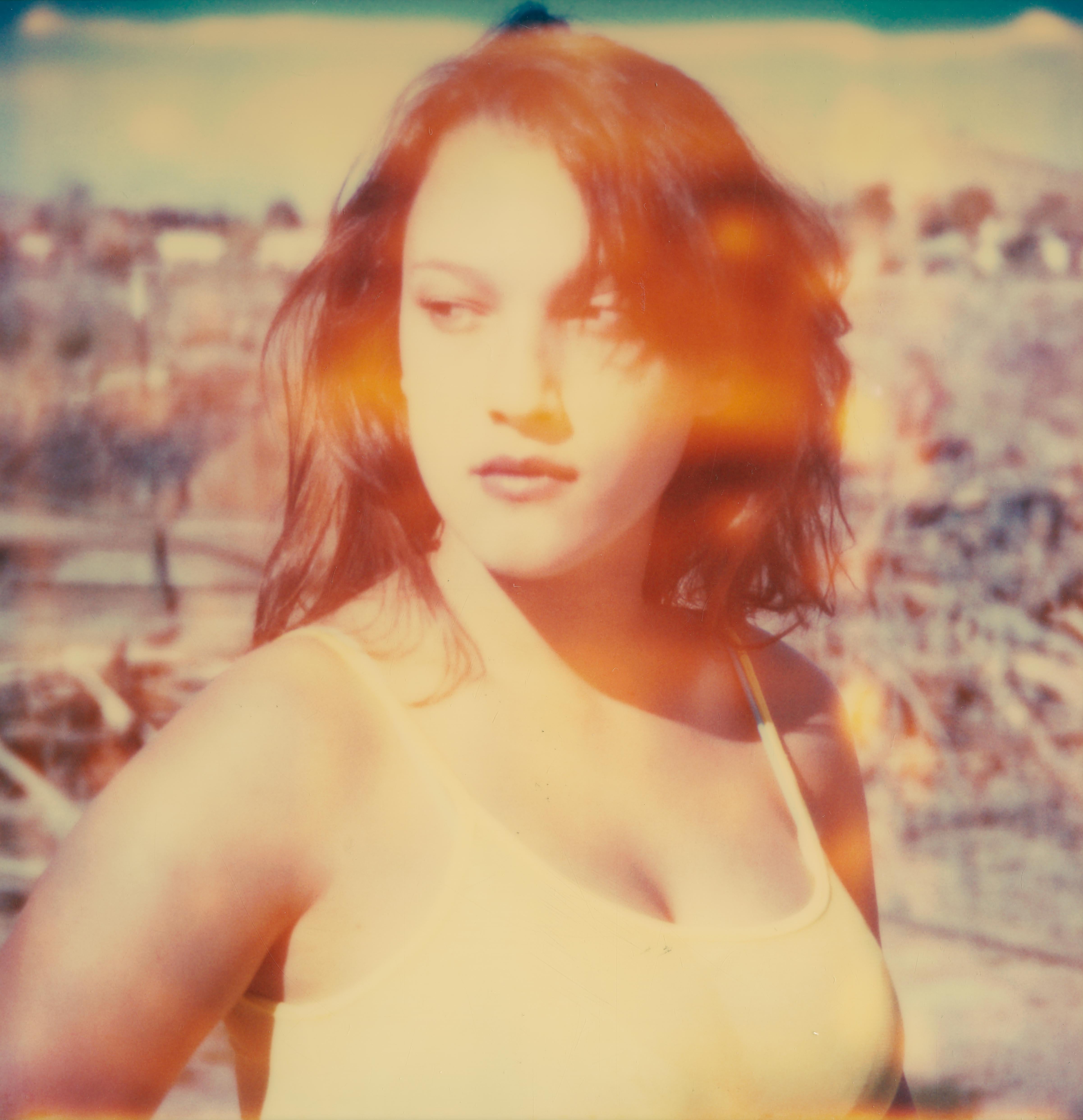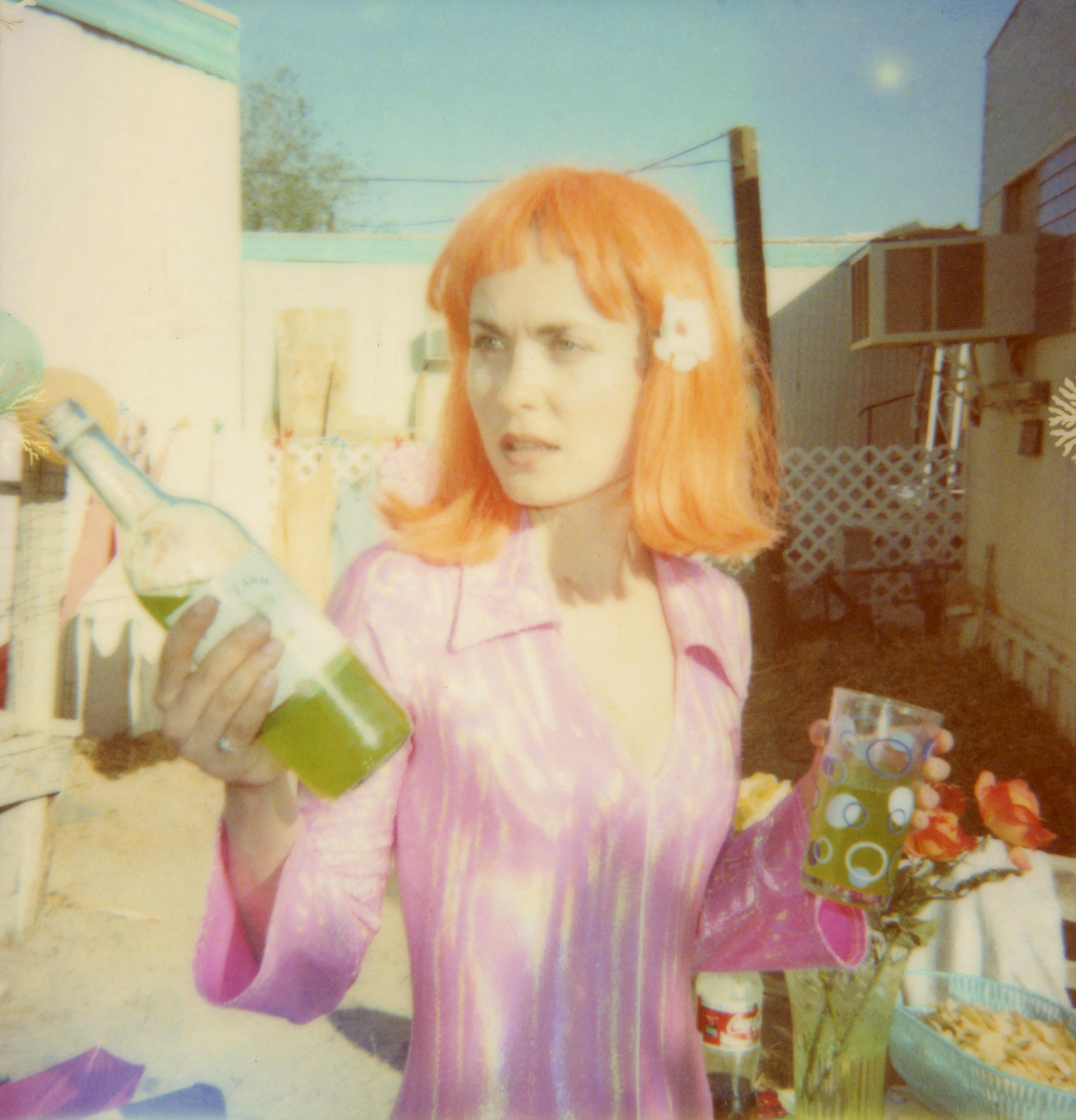Items Similar to 10525 -part 3- Stranger than Paradise - 20x20cm
Want more images or videos?
Request additional images or videos from the seller
1 of 3
Stefanie Schneider10525 -part 3- Stranger than Paradise - 20x20cm1999
1999
About the Item
'10525' part 3 (Stranger than Paradise) - 1999
20x20cm,
Edition 4/10,
Archival C-Print, based on a Polaroid,
Certificate and Signature label, artist Inventory No. 388_3.54
Not mounted.
Stefanie Schneider: A German view of the American West
The works of Stefanie Schneider evoke Ed Ruscha's obsession with the American experience, the richness of Georgia O'Keefe's deserts and the loneliness of Edward Hopper's haunting paintings. So how exactly did this German photographer become one of the most important artists of the American narrative of the 20th and 21st century?
Born in Germany in 1968, photographer Schneider used to divide her time between Berlin and Los Angeles from the 90's until settling permanently where her process begins in the American West, in locations such as the planes and deserts of Southern California, where she photographs her subjects. In Berlin, Schneider developed and enlarged her works by hand.
This theme of preservation and deterioration is a core part of Schneider's oeuvre. In an interview in October 2014 with Artnet, the artist explained how her own experiences of pain and loss inspire her. ''My work resembles my life: Love, lost and unrequited, leaves its mark in our lives as a senseless pain that has no place in the present.''
''The ex-lover experiences the residues of love as an amputee experiences the sensation of a ghost limb.'' - Stefanie Schneider
Schneider's subjects are often featured in apocalyptic settings: desert planes, trailer parks, oilfields, run-down motels and empty beaches, alone, or if not, not connected with one another. ''It is the tangible experience of ''absence'' that has inspired my work,'' explained Schneider.
Barnebys, May 3rd, 2017
Stefanie Schneider interviewed by Dutch Filmmaker Willem Baptist
When did you first decide to work with Polaroids? Why do Polaroids seem to be so well tuned to our (artistic) senses, perception and minds?
I started using expired Polaroid film in 1996. It has the most beautiful quality and perfectly encapsulates my vision. The colors on one hand, but then the magic moment of witnessing the image appear. Time seems to stand still, and the act of watching the image develop can be shared with the people around you. It captures a moment, which becomes the past so instantly that the decay of time is even more apparent; – it gives the image a certain sentimentality. The Polaroid moment is an original every time. An artifact.
Why use a medium from the past?
For me, analog has always been there in the present. For the new generation, analog is interesting because it's new to them. I understand that people growing up in a digital age will wonder about its usefulness, but it's theirs to recover if they want to. When I first started working with Polaroid, it wasn't the past. It was a partially forgotten medium, but it existed nonetheless. It is mine by choice as there is no substitute for tangible beauty.
Is it imperfect?
The imperfect perfection in a “wabi-sabi” kind of way.
Wabi-sabi (侘寂) represents a comprehensive Japanese world view or aesthetic centered on the acceptance of transience and imperfection. The aesthetic is sometimes described as one of beauty that is imperfect, impermanent, and incomplete.
'If an object or expression can bring about, within us, a sense of serene melancholy and a spiritual longing, then that object could be said to be wabi-sabi'. 'Wabi-sabi nurtures all that is authentic by acknowledging three simple realities: nothing lasts, nothing is finished, and nothing is perfect.'
Is the Polaroid photograph recognizable or even sometimes cliché?
Absolutely! There's something cliché about the way I'm showing the American Dream. I live it myself, trying to find perfection in an imperfect world. Reaching for the horizon. The dream is broken; the cliché tumbles. There are different ways to involve an audience. You could make movies like Harmony Korine's 'Gummo' a masterpiece in my view but which would probably estrange a large part of an audience. A certain film education is a prerequisite. Or you can start with clichés, the audience then feels safe, which lures them into the depth of your world without them even knowing it or understanding where exactly they are being led to. Appealing to emotions and the sub-conscious. Normal, Change, New Normal.
You continually revisit the landscape of the American West in your work. What draws you back to this scene?
Southern California represents a dream to me. The contrast of Northern Germany, where I grew up, to the endless sunshine of Los Angeles was what first attracted me. The American West is my dream of choice. Wide, open spaces give perspectives that articulate emotions and desires. Isolation feeds feelings of freedom or sometimes the pondering of your past. The High Desert of 29 Palms has very clear and vivid light, which is vital. Expired Polaroid film produces 'imperfections' that I would argue mirrors the decline of the American dream. These so called 'imperfections' illustrate the reality of that dream turning into a nightmare. The disintegration of Western society.
Are you playing with the temporality of the material and the value of the moment itself?
The value of the moment is paramount, for it is that moment that you're trying to transform. All material is temporary, it's relative, and time is forever.
Why does analog film feel more pure and intuitive?
It's tangible and bright and represents a single moment.
The digital moment may stay in the box (the hard drive / camera / computer etc.)
forever, never to be touched, or put into a photo album, sent in a letter, or hung on a wall.
Printing makes it an accomplishment.
The analog world is more selective because it's real. Film is a choice.
The digital worldwide clicking destroys this moment. The generation without memories due to information overload and hard drive failures. Photo albums are a thing of the past.
Why does it feel this way?
That's how the human instinct works. When I was a child, every picture been taken was a special moment. Analog photographic film as well as Super-8 material were expensive treasures. My family's memories were created by choosing certain moments in time. There was an effort behind the picture. The roll of film might wait months inside the camera before it was all used. From there, the film required developing, which took more time, and finally, when the photos were picked up from the shop, the memories were visited again together as a family. Who knew then, how fleeting these times were. Shared memories was a ritual.
What's your philosophy behind the art of Polaroid pictures?
The 'obsolete' is anything but obsolete. Things are not always as they appear, and there are hidden messages. Our memories and our dreams are under-valued. It is there that real learning and understanding begins by opening yourself to different perspectives. Who we are and where we come from is important. A Polaroid is a testimony to our existence. But our time is fading fast.
What inspired you to use stop motion cinematography?
My work has always resembled movie stills. I remember the first time I brought a box of Polaroids and slid them onto Susanne Vielmetter's desk (my first gallery). Instantly, it became apparent that there was a story to tell. The stories grew. It was undeniable to me, that the emerging story was where I was destined to go. I've made four short films before my latest feature film, The Girl behind the White Picket Fence. This film is 60 minutes long with over 4000 edited Polaroids. Remember that our sub-conscious fills in blanks, the parts missing from the story between photograph stills allow a deeper and more personal experience for the viewer. That is, if you surrender yourself and trust me as the director to lead you somewhere you might not have ever been before.
Why do you think it is important to own art?
'We have art in order not to die of the truth'
Nietzsche
- Creator:Stefanie Schneider (1968, German)
- Creation Year:1999
- Dimensions:Height: 7.88 in (20 cm)Width: 7.88 in (20 cm)Depth: 0.04 in (1 mm)
- Medium:
- Movement & Style:
- Period:
- Condition:
- Gallery Location:Morongo Valley, CA
- Reference Number:1stDibs: LU65238563102
About the Seller
4.9
Platinum Seller
These expertly vetted sellers are 1stDibs' most experienced sellers and are rated highest by our customers.
Established in 1996
1stDibs seller since 2017
953 sales on 1stDibs
Typical response time: 2 hours
- ShippingRetrieving quote...Ships From: Morongo Valley, CA
- Return PolicyA return for this item may be initiated within 7 days of delivery.
More From This SellerView All
- American Pie (Oxana's 30th Birthday) starring Radha Mitchell - PolaroidBy Stefanie SchneiderLocated in Morongo Valley, CAAmerican Pie (Oxana's 30th Birthday) -2007, from the 29 Palms, CA project - 38x36cm, Edition of 10. digital C-Print print, based on a Polaroid, mounted...Category
Early 2000s Contemporary Portrait Photography
MaterialsColor, Polaroid, Plexiglass, Archival Paper, Photographic Paper, C Print
- Untitled (Cathy and Shannon) - Contemporary, 21st Century, PolaroidBy Stefanie SchneiderLocated in Morongo Valley, CAUntitled (Cathy and Shannon) - 2004 20x20cm, Edition of 10, plus 2 Artist Proofs. Archival C-Print, based on a Polaroid. Certificate and Signature label. Artist Inventory No. 481...Category
Early 2000s Contemporary Color Photography
MaterialsArchival Paper, Photographic Paper, C Print, Color, Polaroid
- Home, sweet 29 (Oxana's 30th Birthday) - part of the 29 Palms, CA projectBy Stefanie SchneiderLocated in Morongo Valley, CAHome, sweet 29 (Oxana's 30th Birthday) - part of the 29 Palms, CA project - 2007 Edition of 5 plus 2 Artist Proofs, 58x56cm. Analog C-Print, hand-printed by the artist, based on...Category
Early 2000s Contemporary Portrait Photography
MaterialsArchival Paper, Photographic Paper, C Print, Color, Polaroid
- Untitled (Cathy and Shannon) - Contemporary, 21st Century, PolaroidBy Stefanie SchneiderLocated in Morongo Valley, CAUntitled (Cathy and Shannon) - 2004 20x20cm, Edition of 10, plus 2 Artist Proofs. Archival C-Print, based on a Polaroid. Certificate and Signature label. Artist Inventory No. 480...Category
Early 2000s Contemporary Color Photography
MaterialsColor, Polaroid, Archival Paper, Photographic Paper, C Print
- Untitled (Cathy and Shannon) - Contemporary, 21st Century, PolaroidBy Stefanie SchneiderLocated in Morongo Valley, CAUntitled (Cathy and Shannon) - 2004 20x20cm, Edition of 10, plus 2 Artist Proofs. Archival C-Print, based on a Polaroid. Certificate and Signature label. Artist Inventory No. 490...Category
Early 2000s Contemporary Color Photography
MaterialsArchival Paper, Photographic Paper, C Print, Color, Polaroid
- 'Looking back' (Till Death do us Part) - 21st Century, Polaroid, ContemporaryBy Stefanie SchneiderLocated in Morongo Valley, CALooking back (Till Death do us Part) - 2005, 50x50cm, Edition of 10, digital C-Print print, based on a Polaroid, Certificate and Signature label, artist Inventory No. 9485, Not ...Category
Early 2000s Contemporary Portrait Photography
MaterialsArchival Paper, Photographic Paper, C Print, Color, Polaroid
You May Also Like
- Terry O'Neill - Faye Dunaway at the Pool, Photography 1977, Printed AfterBy Terry O'NeillLocated in Greenwich, CTAmerican actress Dorothy Faye Dunaway was one of the hottest actresses in the 1970s playing neurotic, highly driven women with sex appeal. She worked onstage before moving to the big...Category
1970s Contemporary Color Photography
MaterialsArchival Paper, Photographic Paper, C Print
- Jimmy Nelson - III 188B // III Gauchos, Argentina, 2011, Printed AfterBy Jimmy NelsonLocated in Greenwich, CTAll available sizes & editions for each size of this photograph: 29.13" X 24.4" Edition of 9 47.24" X 39.37" Edition of 6 66.93" X 55.12" Edition of 3 81.7" X 66.93" Edition of 1 II...Category
2010s Contemporary Color Photography
MaterialsPhotographic Paper, C Print, Digital Pigment
- Jimmy Nelson - VIII 449 // VIII Maasai, Photography 2010, Printed AfterBy Jimmy NelsonLocated in Greenwich, CTAll available sizes & editions for each size of this photograph: 29.13" X 24.41” Edition of 9 47.24" X 39.37" Edition of 6 66.93" X 55.12" Edition of 3 81.69” X 66.93" Edition of 1 ...Category
2010s Contemporary Color Photography
MaterialsPhotographic Paper, C Print, Digital Pigment
- Jimmy Nelson - XV 82 // XV Papua New Guinea, Photography 2010, Printed AfterBy Jimmy NelsonLocated in Greenwich, CT"XV 82 - Childeren, Goroka, Eastern Highlands, Papua New Guinea, 2010 The indigenous population of the world’s second largest island is one of the most heterogeneous in the world. T...Category
2010s Contemporary Color Photography
MaterialsPhotographic Paper, C Print, Digital Pigment
- Jimmy Nelson - VI 9 // VI Kazakhs, Mongolia, Photography 2011, Printed AfterBy Jimmy NelsonLocated in Greenwich, CTAll available sizes & editions for each size of this photograph: 29.13" X 24.41” Edition of 9 47.24" X 39.37" Edition of 6 66.93" X 55.12" Edition of 3 81.7" X 66.93" Edition of 1 V...Category
2010s Contemporary Color Photography
MaterialsPhotographic Paper, C Print, Digital Pigment
- Jimmy Nelson - XV 73 // XV Papua New Guinea, Photography 2010, Printed AfterBy Jimmy NelsonLocated in Greenwich, CT"XV 73 - Menaja Koke - Ponowi Village, Jalibu Mountains, Western Highlands - Papua New Guinea, 2010 Papua is where we started our two-month trip in Oceania. As a region it’s a lot e...Category
2010s Contemporary Color Photography
MaterialsPhotographic Paper, C Print, Digital Pigment
Recently Viewed
View AllMore Ways To Browse
3 Centuries Shop
Vintage Watch Part
Vintage Super 8
Vintage Wall Click
Vintage Wall Mounted Desk
Retro Wall Mounted Desk
Vintage Watch Los Angeles
Vintage Computer Desk
Japanese Vintage Plane
Retro Mirrors Los Angeles
Vintage Aesthetic Watch
Vintage Stand Up Desk
Vintage Love Letter Paper
Vintage Desks Los Angeles
Digital Vintage Watch
Digital Watch Vintage
Vintage Digital Watches
Vintage Childs Desk
